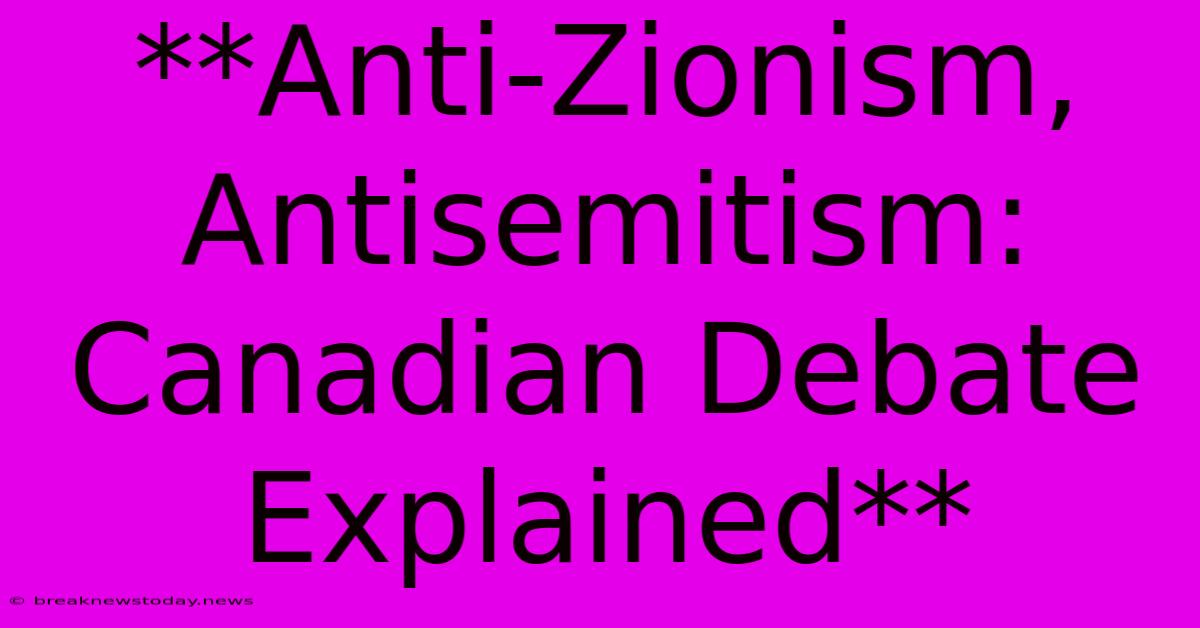**Anti-Zionism, Antisemitism: Canadian Debate Explained**

Discover more detailed and exciting information on our website. Click the link below to start your adventure: Visit Best Website naughtynakes.com. Don't miss out!
Table of Contents
Anti-Zionism, Antisemitism: Navigating the Complex Canadian Debate
The distinction between anti-Zionism and antisemitism has become a hotly debated topic in Canada, often leading to heated exchanges and misunderstandings. This article aims to provide a balanced explanation of this complex issue, exploring the key arguments and concerns surrounding both concepts.
Understanding the Definitions
Anti-Zionism is the opposition to Zionism, a political movement advocating for the establishment and development of a Jewish state in the land of Israel. Anti-Zionists often criticize Israel's policies towards Palestinians and argue that the existence of a Jewish state in Palestine is inherently unjust and a violation of Palestinian rights.
Antisemitism is prejudice, discrimination, or hostility towards Jews. It manifests in various forms, including verbal and physical attacks, economic boycotts, and the spread of harmful stereotypes about Jewish people.
The Overlap and Distinction
The key question at the heart of the debate is whether criticizing Israel's policies, particularly those deemed discriminatory or illegal under international law, constitutes antisemitism. Proponents of this view argue that certain forms of anti-Zionism, especially those targeting the very existence of Israel as a Jewish state, can be seen as antisemitic because they delegitimize Jewish self-determination and perpetuate harmful stereotypes about Jews as a collective.
Conversely, those who maintain that criticizing Israel's policies is not inherently antisemitic argue that it is important to differentiate between legitimate criticism of a state's actions and prejudice against a religious or ethnic group. They emphasize that the right to criticize Israel's policies is essential for holding any government accountable and that equating such criticism with antisemitism silences legitimate voices and hinders meaningful dialogue.
The Canadian Context
The debate on anti-Zionism and antisemitism has significant implications for Canadian society. Canada is home to a large Jewish population and has a strong commitment to combating antisemitism. However, the country also has a robust tradition of free speech and debate, including criticism of government policies.
This tension is reflected in the recent debates surrounding the adoption of the International Holocaust Remembrance Alliance (IHRA) definition of antisemitism, which includes the following example: "Denying the Jewish people their right to self-determination, e.g., by claiming that the existence of a State of Israel is a racist endeavor." Some argue that this definition conflates legitimate criticism of Israel's policies with antisemitism, while others believe it is necessary to address growing instances of anti-Israel rhetoric that crosses the line into antisemitic hate speech.
Moving Forward
Navigating the complex relationship between anti-Zionism and antisemitism requires careful consideration and open dialogue. It is essential to acknowledge the legitimate concerns of both Jewish communities and Palestinian communities, while simultaneously promoting respect for all individuals and groups. The key lies in finding a balance between freedom of expression, the right to criticize governments, and the fight against prejudice and discrimination.
By promoting critical thinking, fostering understanding across different perspectives, and engaging in respectful dialogue, Canadians can contribute to a more inclusive and equitable society where both freedom of speech and the fight against antisemitism are upheld.
Further Reading:
Remember: This article is meant to provide a balanced overview of a complex issue and does not represent a definitive stance. The author encourages readers to engage with diverse perspectives and form their own informed opinions.

Thank you for visiting our website wich cover about **Anti-Zionism, Antisemitism: Canadian Debate Explained** . We hope the information provided has been useful to you. Feel free to contact us if you have any questions or need further assistance. See you next time and dont miss to bookmark.
Featured Posts
-
London Tube Strikes November Updates
Nov 02, 2024
-
Nrj Music Awards 2024 Twijfels Over Slimanes Aanwezigheid
Nov 02, 2024
-
Nrj Awards Helena En Lenie Samen Op De Rode Loper
Nov 02, 2024
-
Day Of The Dead Events In Edmonton This Weekend
Nov 02, 2024
-
Govt Denounces Racial Provocation
Nov 02, 2024
